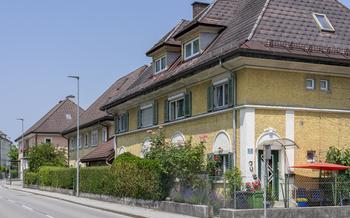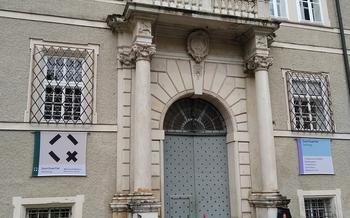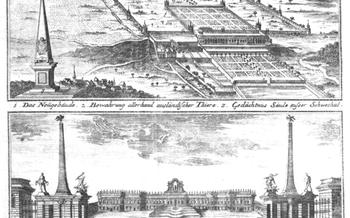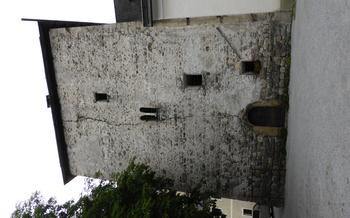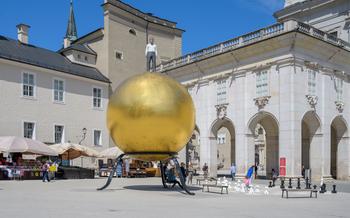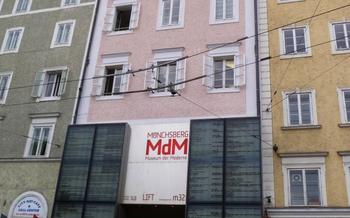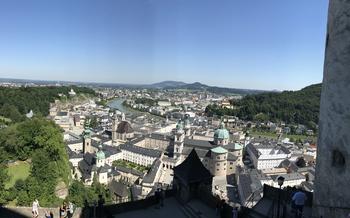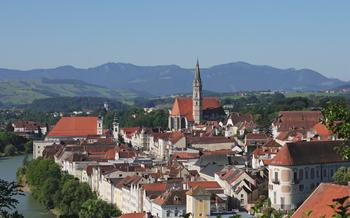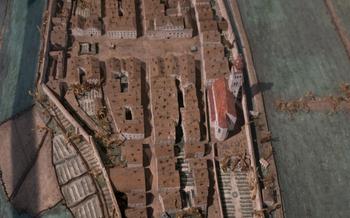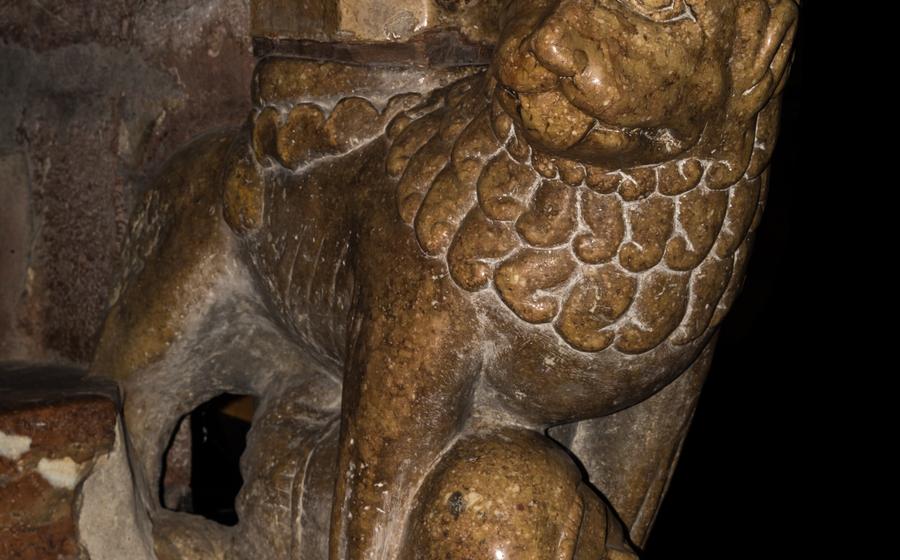
Franciscan Church
- A City of Music and Baroque Charm
- History and Heritage
- Franciscan Church (Franziskanerkirche)
- Location and Accessibility
- Architectural Style
- Historical Significance
- Cultural and Religious Importance
- Visiting the Franciscan Church
- Things to See and Do
- Nearby Attractions
- Local Cuisine and Restaurants:
- Souvenirs and Shopping
- Accommodation Options
- Insider Tip:
A City of Music and Baroque Charm
Salzburg, nestled in the heart of Austria, is a city steeped in cultural and musical heritage. Its enchanting streets, lined with Baroque architecture, bear witness to its rich history and artistic legacy. The city's identity is intertwined with the genius of Wolfgang Amadeus Mozart, whose birthplace and residence are treasured landmarks. The Sound of Music, an iconic film set against Salzburg's picturesque backdrop, has further cemented the city's reputation as a cultural hub. Salzburg's vibrant cultural scene boasts numerous festivals throughout the year, showcasing classical music concerts, theater performances, and art exhibitions that attract visitors from around the world.
History and Heritage
Salzburg's history is a rich tapestry of influences, dating back to its Celtic origins. The city flourished under Roman rule, becoming a significant trading center on the Salzach River. In the 8th century, Salzburg emerged as a major religious center with the establishment of the Prince-Archbishopric of Salzburg. This ecclesiastical state ruled the region for over a thousand years, leaving an indelible mark on the city's architecture, culture, and identity. As a member of the Holy Roman Empire, Salzburg played a crucial role in European politics and diplomacy. Notable historical figures associated with Salzburg include Saint Rupert, the city's patron saint, and Prince-Archbishop Wolf Dietrich von Raitenau, who transformed Salzburg into a Baroque masterpiece.
Franciscan Church (Franziskanerkirche)
The Franciscan Church, or Franziskanerkirche, stands as a testament to the profound impact of the Franciscan Order on Salzburg's religious and cultural landscape. Founded in the 13th century, the church reflects the architectural style of the Gothic period, showcasing pointed arches, ribbed vaults, and flying buttresses that soar towards the heavens.
The interior of the church is a treasure trove of Gothic artistry, adorned with intricate carvings, sculptures, and frescoes that depict biblical scenes and stories from the life of Saint Francis of Assisi. The high altar, crafted with meticulous detail, serves as a focal point, drawing the eye with its elaborate ornamentation and vibrant colors.
Among the notable artworks housed within the church is the impressive stained-glass window depicting the life of Saint Francis. The vibrant hues and intricate craftsmanship of the window cast a kaleidoscope of colors onto the interior, creating a sense of awe and reverence.
Location and Accessibility
The Franciscan Church is situated in the heart of Salzburg's Old Town, making it easily accessible on foot. The church stands on Franziskanergasse, a charming narrow street lined with historical buildings and cafes. Visitors can reach the church by taking a leisurely stroll from the city's main square, Mozartplatz, which is just a few minutes away. Alternatively, public transportation is readily available, with bus stops located nearby. For those arriving by car, parking garages are available within walking distance. A map or directions to the church can be easily found online or obtained from the tourist information center.
Architectural Style
The Franciscan Church, like many other religious structures built during the Gothic period, exhibits the distinctive characteristics of this architectural style. Gothic architecture, which emerged in the 12th century, is known for its pointed arches, ribbed vaults, and flying buttresses. These elements not only contribute to the church's structural stability but also create a sense of height, grandeur, and lightness. The pointed arches, which replace the rounded arches of Romanesque architecture, allow for taller and more slender walls, while the ribbed vaults distribute the weight of the roof more efficiently. The flying buttresses, which extend from the upper walls of the church to the ground, provide additional support and allow for larger windows, flooding the interior with natural light. The combination of these elements creates a visually stunning and awe-inspiring space that reflects the religious and cultural significance of the Franciscan Church.
Historical Significance
The Franciscan Church, with its Gothic grandeur, holds immense historical significance in Salzburg. Erected in the 13th century, it stands as a testament to the city's rich religious heritage. The church played a pivotal role in the spiritual and cultural life of medieval Salzburg, serving as a center for worship, education, and community gatherings. Over the centuries, it has witnessed countless historical events, including the rise and fall of the Prince-Archbishopric, the Protestant Reformation, and the Napoleonic Wars. The Franciscan Church remains a symbol of resilience and continuity, preserving the legacy of Salzburg's past while contributing to its vibrant present.
Cultural and Religious Importance
The Franciscan Church holds immense cultural and religious significance in Salzburg. It serves as a venue for concerts, exhibitions, and other cultural events, showcasing the city's rich artistic heritage. The church's acoustics make it an ideal space for musical performances, ranging from classical concerts to contemporary music.
Moreover, the Franciscan Church remains a vital center for the Catholic community in Salzburg. Regular masses, ceremonies, and pilgrimages take place within its hallowed walls, attracting both locals and visitors. The church's spiritual atmosphere and beautiful surroundings provide a serene setting for prayer, contemplation, and religious observances.
In addition, the Franciscan Church plays a crucial role in promoting interfaith dialogue and understanding. It hosts ecumenical events, lectures, and workshops that bring together people of different faiths to foster mutual respect and cooperation. The church's commitment to interfaith work reflects its dedication to building bridges between communities and fostering a harmonious society.
Visiting the Franciscan Church
The Franciscan Church is open to visitors from Tuesday to Sunday, with varying hours depending on the time of year. Admission is free, making it an accessible attraction for all. To fully appreciate the church's history and significance, consider joining a guided tour led by knowledgeable experts. These tours are available in multiple languages and offer a deeper insight into the church's architecture, artwork, and religious importance. Additionally, audio guides are available for self-guided exploration, allowing visitors to learn at their own pace. While visiting the church, be sure to dress respectfully, as it is an active place of worship. Whether you choose to embark on a guided tour or explore independently, the Franciscan Church promises a captivating and enriching experience for visitors of all backgrounds.
Things to See and Do
Visitors to the Franciscan Church should not miss the opportunity to admire the stunning stained-glass windows that adorn the interior. These windows depict scenes from the life of St. Francis and other religious figures, and they cast a beautiful, colorful light into the church. The intricate carvings and sculptures that decorate the walls and altars are also worth noting, as they showcase the skill and artistry of the craftsmen who created them.
In addition to its religious significance, the Franciscan Church is also a popular venue for concerts and other cultural events. The church's excellent acoustics make it an ideal setting for musical performances, and visitors can often enjoy free concerts or recitals during their visit. Guided tours of the church are also available, which provide visitors with an in-depth look at the history, architecture, and artwork of this important religious site.
To make the most of a visit to the Franciscan Church, it is recommended to plan ahead and check the church's website for information on upcoming events and guided tours. Visitors should also take the time to explore the surrounding area, which is home to many other historical and cultural attractions.
Nearby Attractions
Adjacent to the Franciscan Church stands the renowned Salzburg Museum, a treasure trove of the city's rich history and culture. Within its walls, visitors embark on a journey through time, exploring captivating exhibits that showcase Salzburg's fascinating past, from its Celtic roots to its role as a significant trading hub. The museum's collection boasts an array of artifacts, paintings, and sculptures, inviting visitors to delve into the stories that have shaped this vibrant city.
A short stroll from the Franciscan Church leads to the Kapitelplatz, a picturesque square that exudes a timeless charm. Here, visitors can admire the majestic Salzburg Cathedral, an architectural masterpiece that dominates the city skyline. Its awe-inspiring facade, intricate carvings, and soaring spires are a testament to the artistry and devotion that went into its construction. The Kapitelplatz is also home to the Residenz, a former palace that once housed the Prince-Archbishops of Salzburg. Today, it serves as a museum, offering a glimpse into the opulent lifestyle of these powerful ecclesiastical rulers.
For those seeking a serene escape, the Mirabell Gardens, located just a stone's throw from the Franciscan Church, provide a tranquil oasis amidst the city's bustling streets. Wander through the beautifully manicured gardens, adorned with vibrant flowerbeds, sculptures, and fountains, and soak in the tranquility of this picturesque haven. The gardens offer breathtaking views of the city and the surrounding mountains, making them a perfect spot to relax and rejuvenate.
Local Cuisine and Restaurants:
After exploring the Franciscan Church, indulge in the culinary delights of Salzburg. Numerous restaurants and cafes in the vicinity offer a diverse range of dining options to satisfy every palate. For a taste of traditional Austrian cuisine, try Gasthof Goldgasse, known for its hearty schnitzel and Salzburger Nockerl, a sweet soufflé-like dessert. If you prefer international flavors, head to Restaurant S'Kloane, which serves innovative dishes inspired by global cuisines. For a unique dining experience, visit The Glass Garden, a greenhouse-style restaurant offering panoramic views of the city while you savor your meal. Vegetarian and vegan options are widely available, and the knowledgeable staff can guide you towards suitable choices.
Souvenirs and Shopping
After immersing yourself in the history and beauty of the Franciscan Church, you might want to take a piece of Salzburg home with you. Fortunately, the area surrounding the church offers a variety of shopping opportunities for visitors.
For unique souvenirs and local products, head to the charming shops and boutiques lining the streets near the church. You'll find everything from traditional Austrian handicrafts and artwork to delectable food specialties. Whether you're looking for a memento of your visit or a gift for loved ones back home, you're sure to find something special.
One of the highlights of the shopping scene near the Franciscan Church is the Getreidegasse. This picturesque street, known for its colorful facades and wrought-iron signs, is lined with boutiques, galleries, and specialty shops. Here, you can browse for high-quality souvenirs, including handmade jewelry, ceramics, and textiles.
If you're looking for a more unique shopping experience, be sure to visit the Salzburg Christmas Market (Christkindlmarkt), which takes place annually in the historic Old Town. This festive market offers a wide variety of traditional Austrian goods, including handcrafted ornaments, wooden toys, and delicious treats.
Remember to take advantage of the opportunity to sample some of Salzburg's culinary delights. The area around the Franciscan Church is home to several traditional Austrian restaurants and cafes, where you can indulge in mouthwatering pastries, hearty schnitzel, and refreshing beverages.
Accommodation Options
Adjacent to the Franciscan Church, visitors can find a range of accommodation options to suit every budget and preference.
For a luxurious stay, consider the opulent Hotel Sacher Salzburg, renowned for its elegant rooms, grand ballroom, and rooftop terrace with panoramic city views.
Alternatively, the boutique Hotel am Mirabellplatz offers a more intimate experience with charming rooms, a cozy lounge, and a delightful breakfast buffet.
Budget-conscious travelers may prefer the friendly Jugendgästehaus Salzburg, a youth hostel with clean and comfortable rooms, a communal kitchen, and a vibrant atmosphere.
To immerse yourself in local culture, opt for a stay at a traditional guesthouse like the Pension Elisabeth, which offers homey accommodations, a delicious daily breakfast, and helpful recommendations from the friendly hosts.
Remember to book your accommodation in advance, particularly during the peak tourist season in summer, to secure your desired room and avoid disappointment.
Insider Tip:
For a unique and serene experience, visit the Franciscan Church during the early morning hours before the crowds arrive. The tranquil atmosphere and soft light filtering through the stained-glass windows create a magical ambiance that allows for a deeper appreciation of the church's beauty and spirituality. Take this opportunity to reflect, meditate, or simply bask in the tranquility of this sacred space.
